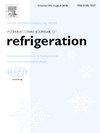在偏远地区实现离网制冷:集成 PCM 的太阳能蒸汽压缩冰箱原型
IF 3.8
2区 工程技术
Q1 ENGINEERING, MECHANICAL
International Journal of Refrigeration-revue Internationale Du Froid
Pub Date : 2024-10-30
DOI:10.1016/j.ijrefrig.2024.10.028
引用次数: 0
摘要
在偏远或离网地区提供疫苗、药品和易腐物品仍然是一项艰巨的挑战。将太阳能光伏(PV)系统与制冷技术相结合,已成为满足这一关键需求的一个前景广阔的解决方案。本文介绍了一种利用可再生能源在偏远地区进行离网制冷的自主太阳能冰箱原型。该系统由一个 160 W 光伏模块、一个 12/24 V 直流压缩机冰箱、一个铅酸电池和一个最大功率点跟踪 (MPPT) 控制器组成。该系统的主要特点是独立配置,完全脱离电网。一项实验活动评估了该系统在实验室中不同设定温度下 24 小时的运行情况。系统采用了水基相变材料 (PCM),以提高其在恶劣室外条件下的自主性。另一项实验活动是模拟原型的功能,同时管理样品溶液的温度,该溶液的熔化温度等于 - 21 °C,以确保其在测试期间处于液态。样品保存的目标范围为 ± 1 °C。试验考虑了一些实际条件,例如通过在冰箱中增加 21 升热量来实现更高的制冷负荷,以及模拟开关门的取放条件。结果表明,太阳能冰箱原型实现了完全脱离电网,为在无电地区保存药品和食品等易腐物品的解决方案铺平了道路。本文章由计算机程序翻译,如有差异,请以英文原文为准。
Achieving off-grid refrigeration in remote areas: A solar-powered vapor compression refrigerator prototype with PCM integration
The availability of vaccines, medicines, and perishable goods in remote or off-grid areas remains a formidable challenge. Integrating solar photovoltaic (PV) systems with refrigeration technology has emerged as a promising solution to address this critical need. This paper presents an autonomous solar-powered refrigerator prototype for off-grid refrigeration in remote areas utilising renewable energy. The system comprises a 160 W photovoltaic module, a 12/24 V DC compressor refrigerator, a lead-acid battery, and a Maximum Power Point Tracking (MPPT) controller. Its main feature is complete autonomy from the electricity grid, thanks to its standalone configuration. An experimental campaign evaluated the system's behaviour in the laboratory for 24 h at different set-point temperatures. A water-based Phase Change Material (PCM) was implemented to improve its autonomy in severe outdoor conditions. A further experimental campaign emulated the functioning of the prototype while managing the temperature of a sample solution whose melting temperature was equal to – 21 °C to ensure its liquid state during the tests. The target range for preserving the sample was defined at ± 1 °C. Several real conditions have been considered, such as higher cooling loads realised through 21 litres of additional thermal mass in the refrigerator and pick and place conditions for simulating the opening and closing of the door. The results demonstrate that the solar refrigerator prototype achieves complete autonomy from the electricity grid, paving the way for solutions for preserving perishable goods such as medicines and food in unelectrified areas.
求助全文
通过发布文献求助,成功后即可免费获取论文全文。
去求助
来源期刊
CiteScore
7.30
自引率
12.80%
发文量
363
审稿时长
3.7 months
期刊介绍:
The International Journal of Refrigeration is published for the International Institute of Refrigeration (IIR) by Elsevier. It is essential reading for all those wishing to keep abreast of research and industrial news in refrigeration, air conditioning and associated fields. This is particularly important in these times of rapid introduction of alternative refrigerants and the emergence of new technology. The journal has published special issues on alternative refrigerants and novel topics in the field of boiling, condensation, heat pumps, food refrigeration, carbon dioxide, ammonia, hydrocarbons, magnetic refrigeration at room temperature, sorptive cooling, phase change materials and slurries, ejector technology, compressors, and solar cooling.
As well as original research papers the International Journal of Refrigeration also includes review articles, papers presented at IIR conferences, short reports and letters describing preliminary results and experimental details, and letters to the Editor on recent areas of discussion and controversy. Other features include forthcoming events, conference reports and book reviews.
Papers are published in either English or French with the IIR news section in both languages.

 求助内容:
求助内容: 应助结果提醒方式:
应助结果提醒方式:


